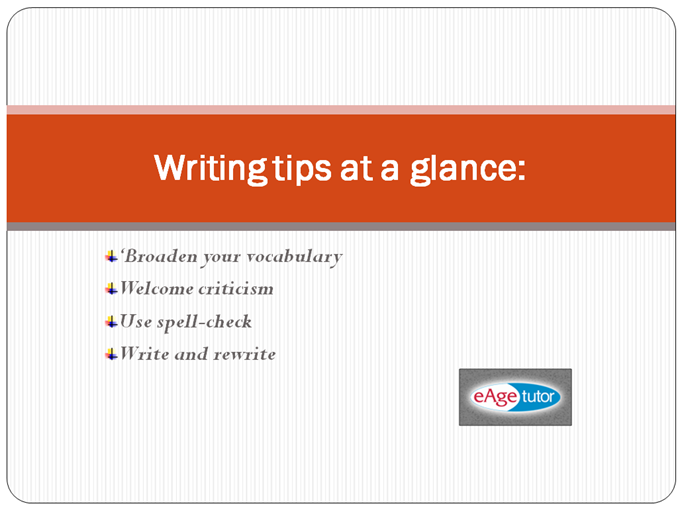Understanding the Tenses in English – II
In our last blog on tenses, we explained why tenses form a vitally important part of the English grammar. Tenses play a key role in written, spoken, as well as English reading. It depends on the various tenses – past, present, or future – to understand the period of time being referred to. A simple sentence like 'I buy mangoes' tells you about the action of buying mangoes, but tells you nothing about whether the action has been completed, is being done or will occur in the future. To lend it some meaning, we need to apply a tense to it. It should be either 'I have bought mangoes' (past tense), 'I am buying mangoes' (present tense) or 'I will buy mangoes' (future tense).
You get the point, right? Just as a perfect sentence needs to have a subject and action to be complete, it also has to have a clear cut tense. A person's ability to use the right form of tense at the right moment speaks a lot about his English prowess.
As mentioned in the earlier blog, tenses are broadly categorized into three – past, present and future. These are further categorized into:
• Present perfect
• Past perfect
• Past progressive
• Past perfect progressive
• Present perfect progressive
We have explained in detail the Present and perfect tense, Past and past perfect tense in our last blog (link of the last blog). Let us proceed with the other tenses.
• Past Progressive: The first part of the tense makes it clear that it is an action/ incident that has happened in the past, however the 'progressive' part implies to the action that was in the continual at the time of the action/ incident. This example should make it amply clear - "I was reading the newspaper this morning." This sentence makes it clear that the incident happened in the morning, but the word 'reading' implies that action was in a continual. 'He was playing all afternoon' is another perfect example of understanding what past progressive tense means.
• Past perfect progressive: This tense is defined by a tense that was being done in the past, but was interrupted. A perfect example of this can be – 'Satish was studying in the morning, only to be disturbed by Hari.' In this sentence, it is clear that Satish was disturbed by Hari – which is a past tense, but the fact that he 'was studying in the morning' – makes it a past progressive tense. After combing the two aspects, we get a Past perfect progressive tense.
• Present perfect progressive: This is very simple to understand. 'He has been studying all day' – this is a perfect example of this tense. Present perfect tense pertains to an action that continues into the present, and does not clearly mention whether it has been accomplished or not. Another example is 'She has been trying hard to make things better for her family.'
Isn't it an easy way to learn about tenses? If you are struggling with the question, 'How can I learn English?' The answer is simple – join a professional online English class like eAgeTutor and get valuable spoken English tips!
English Exercises for Beginners
Imagine this: You have been studying a subject for quite some time, and you think that you have a fair knowledge about it, but how can you be sure about that? The answer is simple, put yourself and your knowledge to test. This way you can gauge how much you really know and how much you need to improve!
Does the idea of taking a test give you the jitters? Worry not, tests do not necessarily have to be difficult and intimidating, tests are a great way of learning and putting your knowledge to use. We have been writing blogs over blogs, giving you useful tips on learning and improving your English skills - spoken, written, as well as reading. Now, let us see how much you have learnt. Here is a simple test for all of you:
A. Following is a list of words (nouns) and you need to answer the pronoun that will fit with it.
1. __ whistle
a. An
b. A
2. __ yew tree
a. A
b. An
3. __ wonder
a. A
b. An
4. __ hospital
a. A
b. An
5. __ honor's degree
a. A
b. An
So, are you done solving this test? Simple, wasn't it! However, using 'a' and 'an' confuses many. Hopefully, you got them right. Here are the answers (what did you think, we will not provide the answers? However, if you are reading this before you have solved the test above, go back now!)
1. A whistle
2. A yew tree
3. A wonder
4. A hospital
5. An honors degree
Congratulations to all those who got it right, while for those who did not – do not lose heart, keep practicing and improving your English skills.
That was pretty easy, fit for beginners. However, with so many blogs dedicated to teaching English to our fans, here is another test:
B. We have already explored the topic of homophones. These are words that sound the same way but their meanings and spellings are different. Write-right, see-sea, etc. are some examples of homophones. Today we will learn how to use three such homophones – their, there, they're. Each sentence mentioned below will have a word missing, and you have to fit in one of the three – their, there, they're – as applicable.
1. They've forgotten ______ books.
2. ______ are several mistakes in this article.
3. I have met them before but I do not know ______ names.
4. From the look of ______ faces, they are not very happy.
5. They cannot decide. They cannot make up ______ minds.
Did you get all of these right? Here are the answers, match them with yours.
1. Their
2. There
3. Their
4. Their
5. Their
That was fun, right? And you thought tests were boring and difficult! We shall keep giving you such other (not so simple, necessarily) tests, just to keep you on your toes. Till then keep practicing and improving!
If you are still struggling and trying to get your grip on the English language, here is an important tip for you. There are a number of online programs like eAge tutor, which help you in understanding and improving your spoken English. These programs help you learn grammar as well as learn business English.
How to Improve Your English Writing Skills – II
>We hope that our last blog on improving your writing skills was helpful. The tips mentioned there were simple and guaranteed to give results. However, as the saying goes, there is always room for improvement, and you surely cannot know everything that is there to English writing with just a few tips. That is why we bring to you a few more helpful and amazing tips, which will help you take your English writing a notch higher!
your writing skills was helpful. The tips mentioned there were simple and guaranteed to give results. However, as the saying goes, there is always room for improvement, and you surely cannot know everything that is there to English writing with just a few tips. That is why we bring to you a few more helpful and amazing tips, which will help you take your English writing a notch higher!
If you have been wondering, why we are stressing so much on the need of having exemplary English writing skills, and then let us tell you this – the reasons are many, but keep this in mind, English writing is needed in practically every aspect of modern lifestyle. You wish to apply for a job – you shoot an email. You wish to enroll in an academic course – you fill a form. You wish to get something done – you submit an application. And all of this is done in English. Do you need any more reasons for why English writing is an important skill?
Apart from following our tips and practicing them, there is one more exercise you need to do, in order to improve your writing skills. You must know your shortcomings and how to improve upon them. Do not expect to write a bestselling novel right at your first attempt, but surely with patience and practice, you sure can write flourishingly.
• Broaden your vocabulary: How are you supposed to write even a 100-word paragraph without having enough words? Building your vocabulary is the first pedestal of your English learning journey. Read as much as possible and build your vocabulary. The number of words you use, the more vibrant your writing will be. Using the same words repeatedly will make your writing sound repetitive.
• Welcome the criticism: In our last blog, we asked you to always get your writing samples checked – to understand where you need to improve and what mistakes to avoid. The next step to this tip is to take criticism positively and sportingly. If your writing has too many errors, focus on correcting them and make a promise to yourself that you will not repeat the same mistakes.
Use spell-check
: After you are done writing/ typing an article, save it in another document and run spell check/ grammar review software through it. After the other document has been checked and corrected, compare it with your original document. This way you will understand the mistakes you make and how to improve. Pay close attention to spellings and sentence structure.
• Write and rewrite: Every written material has a personality of its own. The words you use and the way you form your sentences sets the tone of your article. It is possible the first time you write something, it might not turn the best. If you are not satisfied with how an article has shaped, do not give up. Rewrite and improve.
"How to improve my English skills" – if this question has been nagging you, then fret not. Nowadays, you have so many ways with which you can improve and polish your English fluency. There are many online programs like eAge tutor available for your benefit. With the help of such programs, you can easily learn fluent English.
How to Improve Your English Writing Skills
The internet is often credited for making the world a global village, for bringing people across various countries, languages and ethnicity, together and inculcating a sense of sharing and oneness among all. All that is very well, but we cannot owe it all to the internet alone. Without English, how far do you reckon, internet could have reached. Whether it is writing programs, creating website and online platforms to the simplest form of online communication, chatting – English has played a pivotal role in the widespread and mass acceptance of the internet media.
Now, why are we stressing on the role of the internet when the topic of our discussion is developing writing skills? For that, answer this question: How many of us literally 'write' with a pen and paper? Writing, largely, is done online nowadays. Whether it is blogging, posting your thoughts or shooting an email, writing plays a key role in everything.
Many intellectuals and English enthusiasts have been blaming the very internet for spoiling the English language. And that seems to be true to a certain extent! People have developed a unique 'chat lingo' to save themselves from writing common phrases. 'You' became 'u', 'we' became 'v', 'there' is now written 'der' and 'gr8' stands for 'great'. Not just that, 'brb', 'ttyl' and 'rofl' have become commonplace too (they stand for 'be right back', 'talk to you later' and 'rolling on the floor laughing' in that particular order)!
This is the reason why it has become difficult for amateur English learners to know what correct English is and what is slang! It is at such times that you need the tips we are going to share. Yes, whenever there is an English language emergency, we will always be there to rescue you!
• Read: Anything and everything that you read online does not amount for real reading. The internet is jam packed with myriad blogs – on possibly every topic under the sun. But who will account for the language's accuracy? When we say read, we mean reading books and magazines. Publications have a strict discipline and a code to follow when it comes to language. Not only is the language impeccable, but everything is done with great detailing - the spellings, grammar, sentence formation, etc. After all articles and magazine reports are old age (and hands down, the original) blogging!
• D-I-Y dictionary: Why take the pain when you can buy a dictionary or consult an online dictionary easily, you will wonder. Have you seen the size of a dictionary, even the pocket one? It is so many pages of words with their words, but how many words do you actually need to refer? Building your own dictionary helps, as you know exactly what word or phrase is noted in your dictionary. And why just words? It is your dictionary, you can note down phrases, jargon, writing tips and amusing quotes, etc. Anything that you fancy and can come handy in the future.
• Get your work checked: Any time you write something, you are sure to think it is perfect, as you have given it your best. However, nothing is ever foolproof, and that is why it is important to get your work checked, preferably someone who is better at English. Another important tip is to take the criticism constructively and use your mistakes as an aid for improving your English writing skills.
If you are serious about improving and developing your written and spoken English skills, your best option is to join any of the numerous online language courses available. Online tutors like eAge are useful and offer amazing results!




